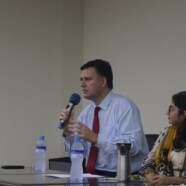APS hosts Panel Discussion on Mental Health

On Monday, October 28th, Armacost Psychological Society successfully hosted its very first mental health panel discussion titled We Are All In This Together. We had the honorable presence of four incredibly accomplished guest speakers: Dr. Ali Mahdeeh Hashmi, who’s a psychiatrist, writer and translator; Ms. Toobah Fatima, a practicing therapist in Lahore who’s working primarily with trauma and depression in young adults; Ms. Eisha Waqar, a professor and mental professional holding six years of achievements in providing exceptional and effective treatment; Dr. Kinza Naeem, the CEO, and Co-founder of Umang.
The talk commenced with Dr. Ali Hashmi discussing some of the myths and flaws in our society’s perception of Mental Health. Often this subject is regarded unspeakable among that part of our communities which is unaware of how grave and real this issue is. Myths about mental illness arise where one misconstrues mental health’s true complexities. Some of these myths are rooted in religious beliefs, like demonic possession and other superficial assumptions. In his talk, Dr. Hashmi educated the audience on the deleterious effects of basing your treatment of mental illness on such beliefs instead of medical and scientific evidence. By asking the question, ‘If mental illness is something made-up, then why are there increasing rates of people who’re dying from it? he reminded us that mental illness is not only real but is also a matter of urgency. His talk proved to be a great way to stir up further conversation, after which the mic passed onto Toobah Fatima.
Her discussion circled around the fact that it is alright to open up about one’s mental health struggles. We all have mental health and we need, more than anything, to take good care of it. She explained to the crowd how depression in young adults can actually be due to conflicts among them and their other relationships. Trying to live through long-term heated conflicts with close relations could be a traumatic experience for young adults. Depression is likely to worsen where one person is unable to resolve that conflict or make the other acknowledge their side better. She then presented us with some of the ways we can avoid the conflict from worsening and heal our relationships. She revealed the lasting imprints of initial experiences on our psychological development later in life.
We learned a significant deal about self-awareness from Eisha Waqar. Eisha brought forth different prospects of self-care, which is just as much a vital and effective part of treatment as is medicine and therapy sessions. Journaling is an example of self-care: to vent out unsettling thoughts on paper is a cathartic, therapeutic process. Even if one isn’t suffering from any serious mental illness, activities like journal writing is still a healthy way of understanding one’s ‘Self’ and situations. Lastly, Dr. Kinza Naeem detailed us on the workings of Umang, Pakistan’s first free of cost mental health helpline providing its services 24/7. It works through a telephonic conversation where the issue is identified and a report is built by certified clinical psychologists. Judging from the telephonic session the distressed person is advised to proper therapy. Umang recently organized Pakistan’s first suicide prevention walk and is now spreading mental health awareness across schools, colleges, and universities of Pakistan. The talk was followed by an interactive Q/A. This part of our event made it even more informative and influential.








